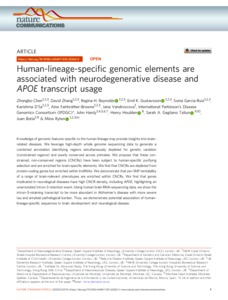Chen, Z;
Zhang, D;
Reynolds, RH;
Gustavsson, EK;
García-Ruiz, S;
D'Sa, K;
Fairbrother-Browne, A;
... Ryten, M; + view all
Chen, Z;
Zhang, D;
Reynolds, RH;
Gustavsson, EK;
García-Ruiz, S;
D'Sa, K;
Fairbrother-Browne, A;
Vandrovcova, J;
International Parkinson’s Disease Genomics Consortium (IPDGC);
Hardy, J;
Houlden, H;
Gagliano Taliun, SA;
Botía, J;
Ryten, M;
- view fewer
(2021)
Human-lineage-specific genomic elements are associated with neurodegenerative disease and APOE transcript usage.
Nature Communications
, 12
, Article 2076. 10.1038/s41467-021-22262-5.

![[thumbnail of Human-lineage-specific genomic elements are associated with neurodegenerative disease and APOE transcript usage.pdf]](https://discovery-pp.ucl.ac.uk/10125797/1.hassmallThumbnailVersion/Human-lineage-specific%20genomic%20elements%20are%20associated%20with%20neurodegenerative%20disease%20and%20APOE%20transcript%20usage.pdf)  Preview |
Text
Human-lineage-specific genomic elements are associated with neurodegenerative disease and APOE transcript usage.pdf
- Published Version
Download (2MB)
| Preview
|
Abstract
Knowledge of genomic features specific to the human lineage may provide insights into brain-related diseases. We leverage high-depth whole genome sequencing data to generate a combined annotation identifying regions simultaneously depleted for genetic variation (constrained regions) and poorly conserved across primates. We propose that these constrained, non-conserved regions (CNCRs) have been subject to human-specific purifying selection and are enriched for brain-specific elements. We find that CNCRs are depleted from protein-coding genes but enriched within lncRNAs. We demonstrate that per-SNP heritability of a range of brain-relevant phenotypes are enriched within CNCRs. We find that genes implicated in neurological diseases have high CNCR density, including APOE, highlighting an unannotated intron-3 retention event. Using human brain RNA-sequencing data, we show the intron-3-retaining transcript to be more abundant in Alzheimer's disease with more severe tau and amyloid pathological burden. Thus, we demonstrate potential association of human-lineage-specific sequences in brain development and neurological disease.
| Type: |
Article
|
| Title: |
Human-lineage-specific genomic elements are associated with neurodegenerative disease and APOE transcript usage. |
| Location: |
England |
| Open access status: |
An open access version is available from UCL Discovery |
| DOI: |
10.1038/s41467-021-22262-5 |
| Publisher version: |
https://doi.org/10.1038/s41467-021-22262-5 |
| Language: |
English |
| Additional information: |
This article is licensed under a Creative Commons Attribution 4.0 International License, which permits use, sharing, adaptation, distribution and reproduction in any medium or format, as long as you give appropriate credit to the original author(s) and the source, provide a link to the Creative Commons license, and indicate if changes were made. The images or other third party material in this article are included in the article’s Creative Commons license, unless indicated otherwise in a credit line to the material. If material is not included in the article’s Creative Commons license and your intended use is not permitted by statutory regulation or exceeds the permitted use, you will need to obtain permission directly from the copyright holder. To view a copy of this license, visit http://creativecommons.org/licenses/by/4.0/. |
| Keywords: |
Alzheimer's disease,
Genetic variation |
| UCL classification: |
UCL
UCL > Provost and Vice Provost Offices > School of Life and Medical Sciences
UCL > Provost and Vice Provost Offices > School of Life and Medical Sciences > Faculty of Brain Sciences
UCL > Provost and Vice Provost Offices > School of Life and Medical Sciences > Faculty of Brain Sciences > UCL Queen Square Institute of Neurology
UCL > Provost and Vice Provost Offices > School of Life and Medical Sciences > Faculty of Brain Sciences > UCL Queen Square Institute of Neurology > Clinical and Movement Neurosciences
UCL > Provost and Vice Provost Offices > School of Life and Medical Sciences > Faculty of Brain Sciences > UCL Queen Square Institute of Neurology > Department of Neuromuscular Diseases
UCL > Provost and Vice Provost Offices > School of Life and Medical Sciences > Faculty of Brain Sciences > UCL Queen Square Institute of Neurology > Neurodegenerative Diseases
UCL > Provost and Vice Provost Offices > School of Life and Medical Sciences > Faculty of Life Sciences
UCL > Provost and Vice Provost Offices > School of Life and Medical Sciences > Faculty of Life Sciences > Div of Biosciences
UCL > Provost and Vice Provost Offices > School of Life and Medical Sciences > Faculty of Life Sciences > Div of Biosciences > Genetics, Evolution and Environment
UCL > Provost and Vice Provost Offices > School of Life and Medical Sciences > Faculty of Life Sciences > UCL School of Pharmacy
UCL > Provost and Vice Provost Offices > School of Life and Medical Sciences > Faculty of Life Sciences > UCL School of Pharmacy > Pharmacology
UCL > Provost and Vice Provost Offices > School of Life and Medical Sciences > Faculty of Population Health Sciences > Institute of Cardiovascular Science
UCL > Provost and Vice Provost Offices > School of Life and Medical Sciences > Faculty of Population Health Sciences > Institute of Cardiovascular Science > Pre-clinical and Fundamental Science
UCL > Provost and Vice Provost Offices > School of Life and Medical Sciences > Faculty of Population Health Sciences > UCL GOS Institute of Child Health
UCL > Provost and Vice Provost Offices > School of Life and Medical Sciences > Faculty of Population Health Sciences > UCL GOS Institute of Child Health > Genetics and Genomic Medicine Dept |
| URI: |
https://discovery-pp.ucl.ac.uk/id/eprint/10125797 |
Download activity - last month

Download activity - last 12 months

Downloads by country - last 12 months

Archive Staff Only
 |
View Item |




